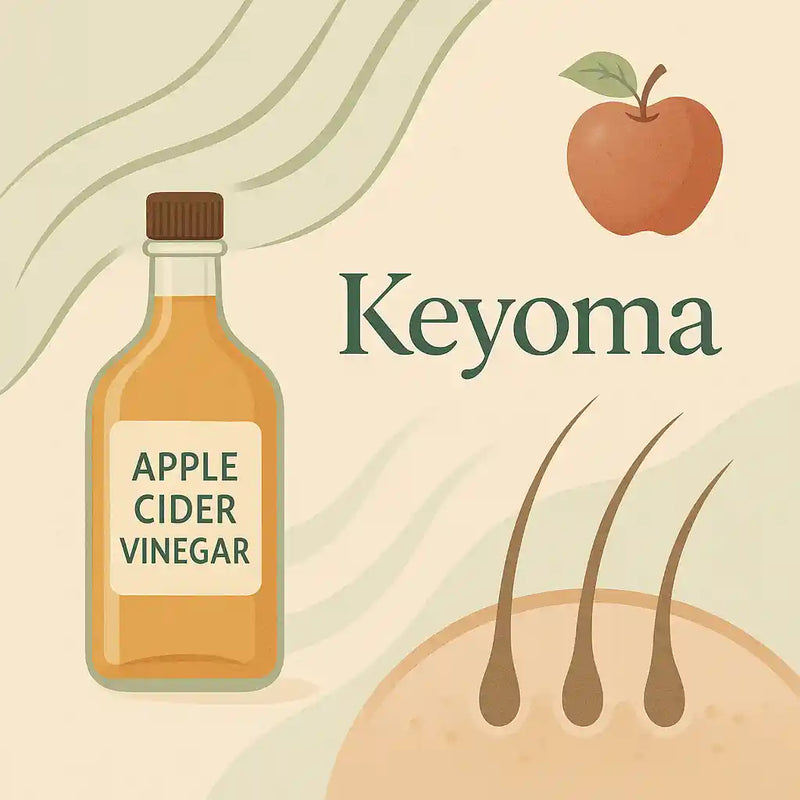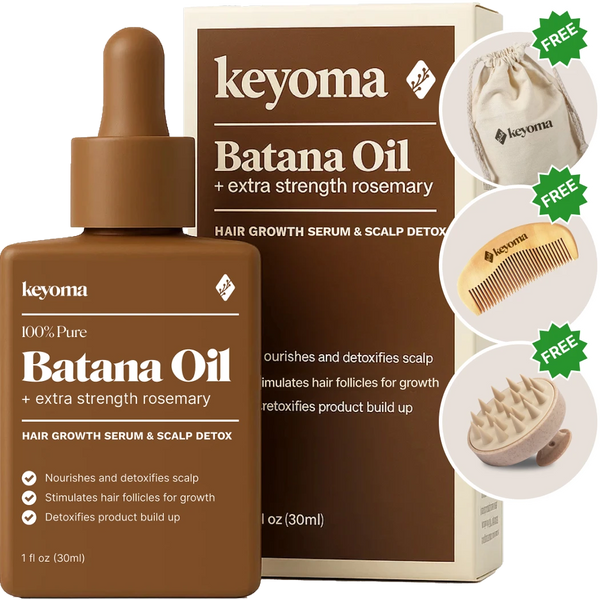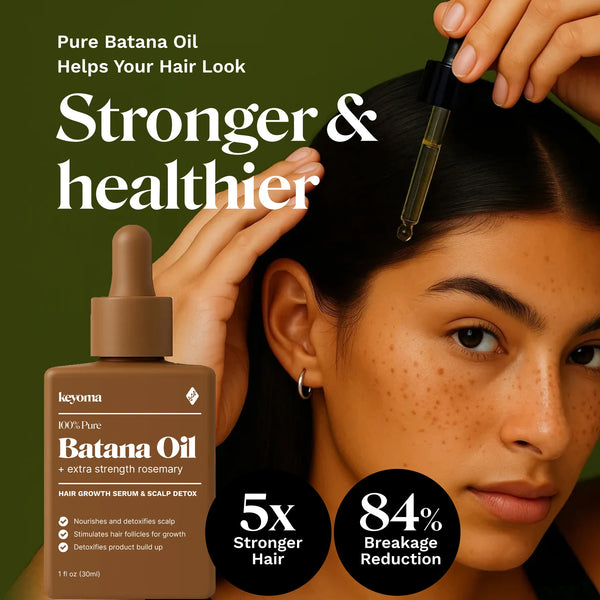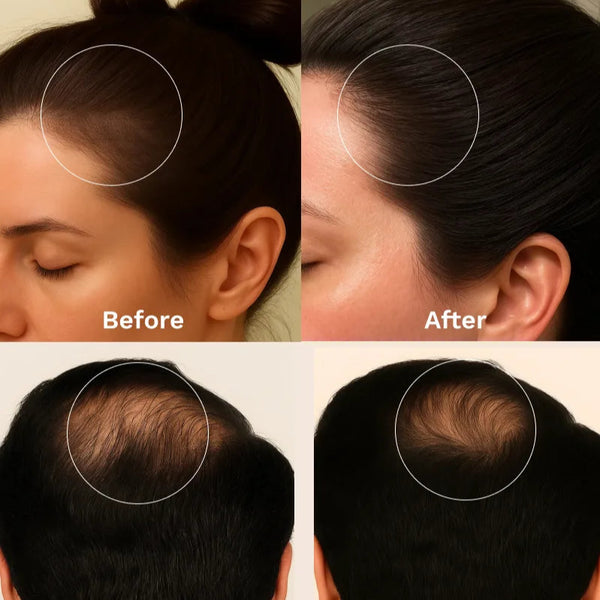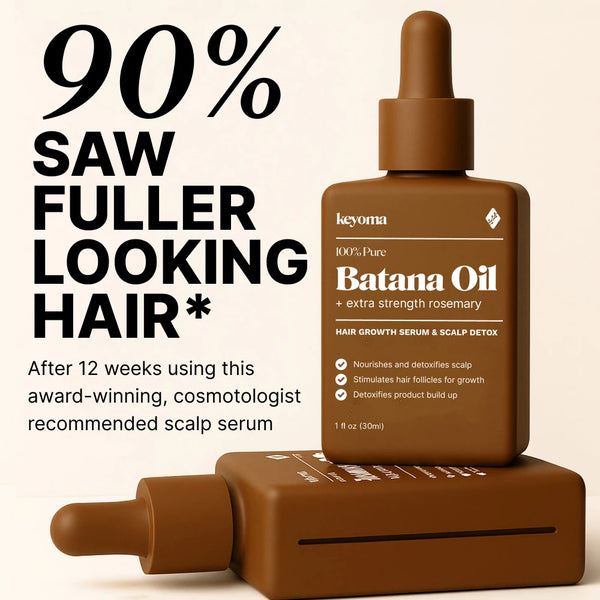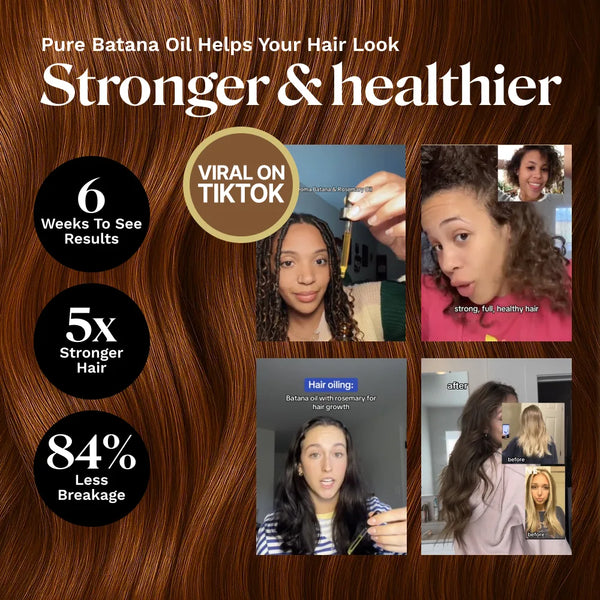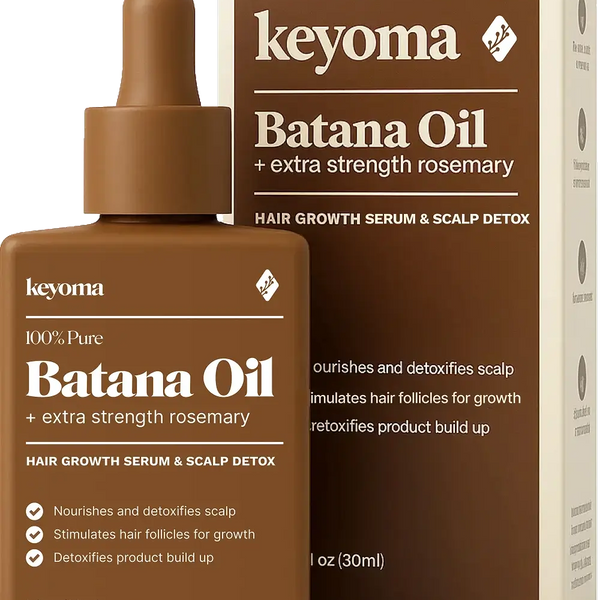In this article
Hair loss can feel overwhelming, especially when you start seeing more strands on your pillow or in the shower. And it can leave you thinking, "What do I do now?" Some people panic. Others go straight to searching for natural fixes. You might be wondering if there is something simple that actually works.
Many people today are turning to natural remedies like apple cider vinegar (ACV). They are hoping it can help bring balance back to their scalp health and encourage stronger hair growth. Some say ACV is just a kitchen staple. Others? They believe it holds real potential for reducing hair fall.
But is it really a safe and effective option for your hair? It is not perfect, but it might be worth a closer look.
You deserve honest answers that help you feel safe and confident about what you choose for your hair.
What Is Apple Cider Vinegar (ACV) and Why Is It Popular for Hair?
Apple cider vinegar, often called ACV, is a natural liquid made by fermenting apple juice. As apples break down, their sugars turn into acetic acid, which gives ACV its sharp smell and sour taste. And this simple process has been around for generations. People have used ACV in natural health and beauty routines for a long time.
You might be wondering why ACV is so popular in hair care. One big reason is its low pH level. It usually falls between 2.7 and 3.2, which is more acidic than our hair’s natural pH of about 4.5 to 5.5. This low pH helps support scalp balance and hair health. Some people swear by it. Others are just starting to give it a try. And many love that ACV is a simple, natural product that fits easily into homemade beauty routines.
Potential Hair Benefits of ACV

Apple cider vinegar is not just another kitchen ingredient sitting on your shelf. And it is definitely not just for cooking. Some people swear by it for more than salad dressings. When used the right way, ACV can support scalp health, help manage buildup and irritation, and create a clean base so your hair treatments can actually work better.
That is what makes ACV stand out. It is simple. It is not fancy. But when you use it with a little care, it can make a big difference. You might be wondering how something so ordinary can help your hair. Let us break it down and see why apple cider vinegar is still trusted by so many.
Scalp pH Balancing and Cuticle Smoothing
When hair becomes too alkaline, it can feel rough, dry, and more likely to break. And that is when things start to get frustrating. But apple cider vinegar’s low pH helps balance the scalp’s acidity, gently bringing the hair back to a healthier place. And when the scalp and hair return to their natural pH, the hair cuticles lie flat, which often leads to shinier, stronger, and smoother strands.
You might be wondering if this is just talk. Well, a 2014 study from the International Journal of Trichology looked at 123 shampoos and found that many had an alkaline pH. This can cause hair friction, frizz, and breakage. Lower pH products, like ACV, were shown to keep the cuticle sealed and help reduce damage.
Buildup and Residue Removal
Many people reach for apple cider vinegar because it helps remove product buildup, oils, and dirt that regular shampoos sometimes leave behind. And over time, all those layers of leftover products, hard water minerals, and natural scalp oils can pile up. You might not notice it at first, but eventually, it can block follicles and make hair look dull and heavy.
Apple cider vinegar works as a natural clarifier. It gently breaks down these layers without harsh chemicals. Some people swear by it. Others are just giving it a try. But clearing away this buildup can leave your scalp feeling fresh and your hair looking smoother, softer, and maybe even a little more vibrant.
Antifungal and Antibacterial Properties
Apple cider vinegar has been used for years as a natural way to manage dandruff and scalp irritation. And you might be wondering what gives it that power. Its acetic acid gives it mild antifungal and antibacterial properties, which may help slow the growth of unwanted organisms like Malassezia, the fungus often linked to dandruff.
When ACV creates a scalp environment that is less friendly to bacteria and fungi, it can support a cleaner, healthier scalp. Many people appreciate that ACV can offer this gentle care without harsh chemicals. It is not perfect, but it works for a lot of people.
Helping Other Treatments Absorb Better
When your scalp is filled with buildup or feels out of balance, it can block nourishing treatments like Batana Oil with rosemary from doing their job. And that can make you wonder why your favorite oils are not giving you the results you hoped for.
You might be thinking, "Is something getting in the way?" Using apple cider vinegar as a pre-treatment rinse can help. It clears the scalp and makes room for oils and hair growth treatments to actually reach the follicles. This step is simple. It is not complicated. But it can really improve how well your products work.
Some people swear by this step. Others have never tried it.
Apple Cider Vinegar for Hair Loss: What the Evidence Says
Many people wonder if apple cider vinegar can really help with hair loss or if it is just another passing trend. And that curiosity makes sense. Some people swear by it. Others are still unsure. It is always good to check what research says and what real people have actually experienced. You might be wondering if there is more to ACV than just kitchen talk.
Let us take a closer look at the studies, personal stories, and possible risks to get the full picture before deciding if ACV is the right fit for your routine.
There is limited direct clinical research proving that apple cider vinegar can stop hair loss. But some studies have explored its helpful properties that may indirectly support scalp health and make hair feel stronger. One example is a 2014 study published in the International Journal of Trichology, which emphasized that acidic hair products can help maintain scalp pH and prevent hair shaft damage and breakage. Since ACV is naturally acidic, it may help create the right environment for healthier hair.
Another review in 2021 from "Dermatology Practical & Conceptual" discussed how acetic acid has antibacterial and antifungal effects. This can help manage scalp problems like dandruff. And when you take care of these scalp issues, it may help reduce hair shedding and support overall scalp health.
These studies do not directly show that ACV can regrow hair. It is not a miracle fix. But they help explain why ACV is often part of a supportive scalp care routine.
How to Safely Use ACV for Hair

Knowing how to use apple cider vinegar the right way is just as important as understanding why it can help. And this is where many people go wrong. When used properly, ACV can support scalp health, boost hair shine, and work well with your favorite hair care treatments. But using it the wrong way or applying it too often? That can lead to irritation and dryness pretty quickly.
You might be thinking, "It sounds simple, but how do I actually use it safely?" Let us break it down so you can confidently add ACV to your routine and enjoy the good without worrying about the bad
Recommended Dilution Ratios
Apple cider vinegar should always be diluted before using it on your hair or scalp. And this is something many people overlook. Some just pour it straight on, but applying it directly can cause irritation, dryness, or a burning sensation. That is why starting with a 1:5 ratio works well. This means one part ACV mixed with five parts water. If you have a sensitive scalp, a 1:10 ratio is usually the safer bet.
If this is your first time trying ACV, go with the gentler mix. See how your scalp and hair react before adjusting. Some people even fine-tune their dilution based on hair type. Oily hair? It can usually handle a stronger mix like 1:5. But dry, curly, or delicate hair tends to like something weaker, maybe 1:10 or even more watered down.
Frequency of Use for Different Hair Types
How often you use apple cider vinegar really depends on your hair type and how sensitive your scalp is. And this is where things can get a little personal. For oily hair, using ACV once or twice a week can help control excess oil, reduce buildup, and keep the scalp feeling refreshed. Some people swear by this schedule. Others find that once a week is plenty. And if your hair is more on the normal side, that once-a-week rhythm is usually enough to keep scalp balance and hair softness without drying things out too much.
But if your hair is dry, curly, or color-treated, you need to slow down a bit and be more careful. In this case, using ACV once every two to three weeks is usually just right. This gives you the clarifying benefits without stripping your hair of its natural moisture. Using it too often on sensitive or dry hair can lead to irritation, dryness, or breakage.
Application Methods: Rinse, Shampoo, or Ready-Made Products
There are a few simple ways to safely add apple cider vinegar to your hair routine. And the most common is the ACV rinse. After shampooing, you just pour the diluted ACV mixture over your hair, leave it on for a few minutes, and rinse it out thoroughly with water. This method helps clarify the scalp and smooth the hair strands. Some people swear by this. Others might feel unsure the first time they try it. That is perfectly fine.
You might be wondering if you can make it even easier. Some people choose to add a few tablespoons of ACV directly to their shampoo or conditioner. And while this can offer gentle scalp balancing without needing a separate rinse, it may not fully clean the scalp as well as a direct rinse does.
There are also ready-made products like ACV hair rinses, shampoos, and sprays. These are pre-measured and carefully made for safe use. And they can be a great pick if you prefer something quick and convenient without the mixing step.
Can You Use Apple Cider Vinegar with Batana Oil and Rosemary?
Yes, you can safely use apple cider vinegar with Batana Oil and rosemary. And when you use them in the right order, they can actually work really well together. Apple cider vinegar helps prepare the scalp by removing buildup, balancing pH, and clearing blocked follicles. This creates a clean, fresh surface that helps Batana Oil with rosemary absorb deeply and nourish the scalp more effectively.
Start with an apple cider vinegar rinse. After shampooing, pour the diluted ACV mixture over your hair, leave it on for a few minutes, and rinse it out thoroughly with water. This step helps wash away residue, dirt, and excess oils. Once your scalp is clean and dry, you can gently massage Batana Oil with rosemary into your scalp. This step delivers nourishing, growth-supporting nutrients right where your hair needs them most.
But here is something important. You should not mix apple cider vinegar and Batana Oil in the same solution. ACV is water-based and acidic. Batana Oil is oil-based and made to moisturize. When you mix them together, they may not work well and can even feel sticky or uneven when applied.
Is ACV Enough for Hair Regrowth?
Apple cider vinegar can be a helpful part of your hair care routine. And it can do some good for your scalp. But on its own, it may not fully support significant hair regrowth. ACV is best known for improving scalp health, balancing pH, and removing buildup. These things help create the right environment for hair to grow, but that is not always enough by itself.
You might be wondering what is missing. Well, ACV does not offer the nutrients, fatty acids, or growth-stimulating compounds that your hair needs to grow stronger on its own.
For people dealing with hormonal hair loss, postpartum shedding, or long-term thinning, adding something more nourishing like Batana Oil with rosemary can offer much-needed support. Batana Oil is rich in essential fatty acids, antioxidants, and natural growth boosters that help strengthen hair strands and encourage healthier regrowth.
And often, the best move is to start with apple cider vinegar to clean and balance your scalp. Then follow with a targeted oil like Batana Oil to give your hair the deep nourishment it craves.
Safe, Clean, and Vegan Solutions: Keyoma’s Approach
Choosing the right hair products is not just about solving hair loss. It is also about trusting what you use on your body. And that trust matters. Keyoma’s Batana Oil with rosemary is made with vegan, cruelty-free, sulfate-free, and paraben-free ingredients that support a clean, conscious lifestyle. It is completely free from harsh chemicals, synthetic additives, and unnecessary fillers.
Gentle, natural solutions matter. They are kinder to your body and better for the planet. Keyoma focuses on nourishing, plant-based ingredients that support healthy, balanced scalps over time.
Every bottle is made in small, carefully crafted batches to ensure freshness and quality. And this hand-crafted process shows the care we put into every product we make.
If you are ready to start your journey to healthier, fuller hair, explore our Batana Oil with rosemary.
Featured Product
100% Pure Batana Oil + Rosemary
↓El mejor aceite de Batana para comprar↓
1 mes
Suscríbete y ahorra
- Suministro para 30 días entregado mensualmente $35
- 30% de descuento de por vida $6
- Kit de productos esenciales para el cuidado del cabello GRATIS $33
- Peine de madera personalizado GRATIS $10
- Masajeador de cuero cabelludo GRATIS $15
- Bolsa de viaje ecológica GRATIS $8
- Garantía de devolución de dinero de 30 días
- Envío gratis
- Portal en línea para cancelar, omitir o pausar fácilmente.
Compra única por 1 mes
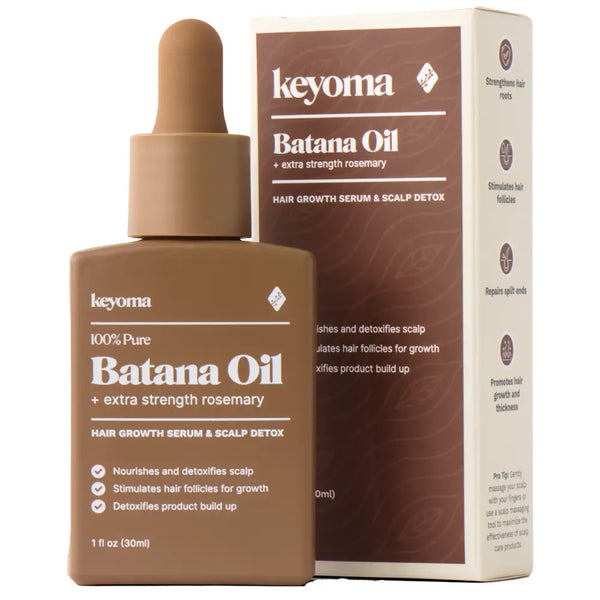
- Suministro para 30 días $50
- 30% de descuento de por vida $6
- Kit gratuito de productos esenciales para el cuidado del cabello $33
- Peine de madera personalizado gratis $10
- Masajeador de cuero cabelludo gratuito $15
- Bolsa de viaje ecológica gratis $8
Tu carrito
Su carrito está actualmente vacío
Podría gustarte...
Buscar en nuestra tienda

